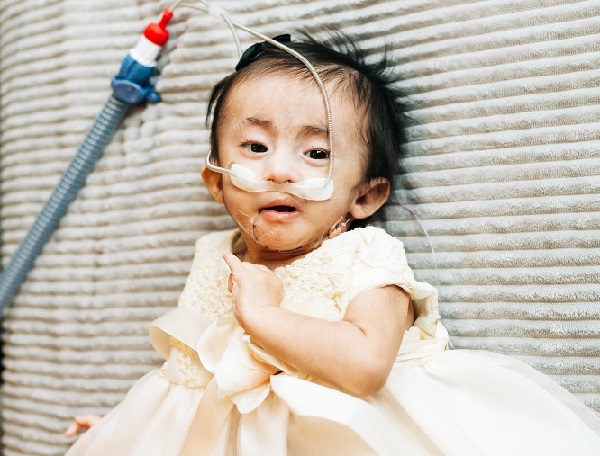Like many first-time parents, Stephanie and Javier Rodriguez were looking forward to finding out their baby’s gender at their 20-week ultrasound. Unfortunately, they also received concerning news.
“There was an abnormality in her brain,” explained Stephanie. “We were sent to have a high-risk ultrasound, where they found her cerebellum was underdeveloped and there was a hole in her heart.”
Stephanie and Javier were told their baby girl had a chromosomal abnormality, but without further testing, they couldn’t be sure whether it was Down syndrome or another chromosomal disorder. They switched their prenatal care to a high-risk OBGYN at Advocate Children’s Hospital – Oak Lawn.
“We chose not to do further testing on our baby because it could have put her at a higher risk of being born prematurely. Our family is Catholic, and we prayed a lot, had her anointed, and she received extra blessings.”
At another ultrasound just after Easter, Stephanie and Javier learned their daughter’s cerebellum was still small, but it was now fully developed. She was also not growing as much as she should be.
“At some point, the doctor could just tell she had a critical chromosomal abnormality and suggested testing me in case she didn’t survive,” she shared.
Stephanie had a blood test, which confirmed there was a 98 percent chance her baby had Edwards syndrome, or trisomy 18, a condition that causes severe developmental delays due to an extra chromosome 18. Most babies with this condition pass away before or shortly after they’re born.
“We kept praying. We were going to have the baby no matter what condition she had. Our Julia was born via C-section on June 7, 2021, at 37 weeks.”
Julia spent two weeks in the neonatal intensive care unit at Advocate Children’s Hospital. On her third day, she no longer required oxygen and was able to take a bottle. After 18 nights in the hospital, she was discharged.
“We brought her home, and she got to meet some of her family. But a few weeks later, she was having trouble breathing and tolerating food, so we took her back to the hospital. She was put on high-flow oxygen and heart failure medication,” said Stephanie. “We stayed there for almost three weeks. Her oxygen levels dropped to dangerous levels, and she turned blue. There were several times that we thought we were going to lose her.”
The care team considered heart surgery, but she was less than two months old, weighed just over three pounds, and had unstable oxygen levels. They determined surgery would not be safe for Julia. Stephanie and Javier had to decide how to proceed with their daughter’s care.
“We could have kept her in the hospital on high-flow oxygen or taken her off the oxygen to live her last days at home. We wanted to keep her on high-flow oxygen and bring her home, but we needed approval from our insurance company. The palliative care team helped us advocate for that.”
Palliative and supportive care is a specialty that focuses on enhancing the quality of life for children and families facing serious, potentially life-limiting and often complex conditions. It also assists families who are aware of prenatal conditions so they can plan for the future.
“We’ve been so grateful for their support. They’ve answered our questions and helped us see our options from a loving point of view,” shared Stephanie. “There were so many things we didn’t have to worry about because of them.”
Ultimately, their insurance company approved their request to bring Julia home with a high-flow oxygen machine.
“We were trained on how to operate the machine and had to reconfigure our house to make sure we had everything we needed. We got to bring her home on August 12, 2021, and she was able to meet all her family members, which was very important to us.”
Julia will be 18 months old this December. She has physical and occupational therapy at home through Advocate Children’s Hospital’s early intervention program. She’s still on high-flow oxygen and requires a feeding tube.
“We still have a lot of bad days, but she’s the happiest girl with the most beautiful smile,” said Stephanie. “She’s starting to lift up her head. Every day, she surprises us. She’s always been our miracle baby.”
How you can help
The Pediatric Advanced Care Team (PACT) at Advocate Children’s Hospital blends the expertise of specialists in pediatric palliative care and acute pain management into one cohesive program. The team provides support in the treatment of a child’s pain and distressful symptoms, and assistance in care coordination, communication and making informed choices about difficult medical decisions. The goal is to help maximize a child’s wellness and functioning to see them live life to the fullest, despite their illness.
“Together with Julia’s care team, we’re again exploring whether she’s a candidate for heart surgery. We pray for her health every day, and we’re at peace knowing our goals and knowing we have the best team fighting for our little girl.”
PACT is supported, in part, by charitable gifts. You can help families like Julia’s by donating today.
